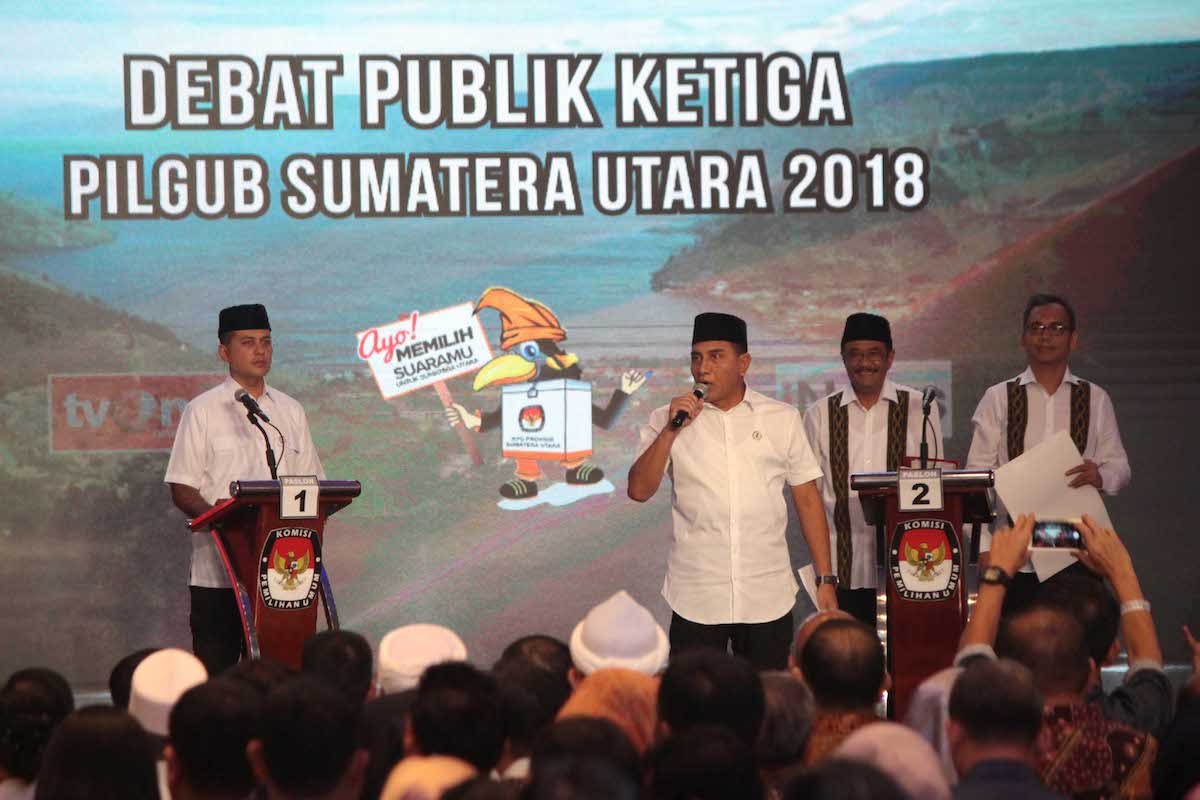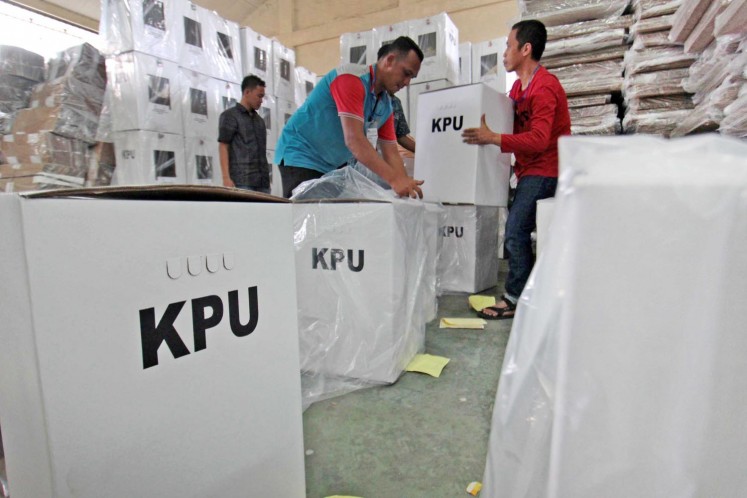Battle between native North Sumatran and outsider
Change Size
 Born to a Melayu Deli family, Edy Rahmayadi (second left) is considered a native North Sumatran. His rival, Djarot Saiful Hidayat (second right), is an outsider to the province. He is a native of East Java and has spent little time in North Sumatra. (Antara/Septianda Perdana)
Born to a Melayu Deli family, Edy Rahmayadi (second left) is considered a native North Sumatran. His rival, Djarot Saiful Hidayat (second right), is an outsider to the province. He is a native of East Java and has spent little time in North Sumatra. (Antara/Septianda Perdana)
M
ore than 9 million people in North Sumatra will vote on Wednesday to elect a new governor, which will be either retired three-star general Edy Rahmayadi or seasoned politician Djarot Saiful Hidayat of the Indonesian Democratic Party of Struggle (PDI-P).
Edy is among the first active military officers to quit their jobs to contest local elections. He made an early start in the race and has the upper hand as a native North Sumatran against his rival Djarot, who is seen as an outsider in the province.
Recent surveys, however, show that it could be a tight race in the fourth most populous province in the country.
Lay of the land
North Sumatra's population is perceived to be predominantly Batak, but it is in fact a multiethnic region where other ethnic groups native to the province, like the Melayu Deli and the Nias, live alongside Javanese, the second-largest ethnic group in the province.
In the 2014 legislative elections, the Golkar Party won some 948,000 votes, followed by the PDI-P with 920,000 votes.
The Gerindra Party came in fourth with roughly 673,000 votes.
Candidates
Born to a Melayu Deli family, Edy is considered a native North Sumatran. Although he was born in Sabang in the predominantly Muslim province of Aceh, he spent his youth in Langkat and Medan in North Sumatra. He spent some of his mid-career at the Bukit Barisan Military Command in North Sumatra before being named its commander in 2015.
Edy was bestowed the Batak clan name Ginting in 2017, around the same time he started to publicly float the idea of running for governor.
His rival, Djarot, is an outsider to the province. He is a native of East Java and has spent little time in North Sumatra.
According to recent surveys, Djarot is most known for his stints as both Jakarta deputy governor and governor.
Unlike Edy, Djarot declined to adopt a North Sumatra clan name, saying "Let me be myself as it will allow me to make friends with all clans, ethnic groups and religions," according to tempo.co.
Edy is running with Musa “Ijeck” Rajekshah, a Medan-born businessman known as an automotive enthusiast, while Djarot has teamed up with Sihar Sitorus, a Batak businessman and owner of Medan-based Pro Duta Soccer Club.
Parties
The North Sumatra race brings to mind the rivalry in the 2014 presidential election, during which PDI-P-backed Joko "Jokowi" Widodo won nationwide over Gerindra chairman Prabowo Subianto. In North Sumatra, however, Prabowo, who was backed by Gerindra and Golkar, among others, won slightly over Jokowi.
In Wednesday's gubernatorial race, four of PDI-P's old rivals -- Gerindra, Golkar, the Prosperous Justice Party (PKS) and the National Mandate Party (PAN) -- have thrown their support behind Edy.
The Hanura Party and the NasDem Party, which have been PDI-P's national-level allies since the 2014 presidential election, are also backing Edy.
The PDI-P, meanwhile, has teamed up with the United Development Party (PPP) to support Djarot.
Initially, a third candidate was contesting the gubernatorial election: Jopinus Ramli Saragih, who was backed by the Democratic Party, the National Awakening Party (PKB) and the Indonesian Justice and Unity Party (PKPI). He was disqualified from the race after it was discovered that he had a fake diploma.
The Dems shifted its support to Edy last month, while the PKB and the PKPI have not announced who they will back.
 Prabowo Subianto. In North Sumatra, however, Prabowo, who was backed by Gerindra and Golkar, among others, won slightly over Jokowi.">
Prabowo Subianto. In North Sumatra, however, Prabowo, who was backed by Gerindra and Golkar, among others, won slightly over Jokowi.">
Early start
Edy announced his bid in July last year, when he was the commander of the Army Strategic Reserves Command (Kostrad), prompting criticism over military neutrality in elections.
He officially resigned from the military in January.
By the time he formally announced his bid, Edy had the endorsement of six parties, which account for a combined 60 regional legislative seats. While Djarot’s party alliance has only a combined 20 seats.
Identity politics?
The Elections Supervisory Agency (Bawaslu) has listed North Sumatra as a region with generally medium vulnerability to conflict related to ethnicity, religion and race.
However, when it comes to the election campaign, the province is considered to have high vulnerability to conflict.
While on the campaign trail, Edy quipped that Djarot was not capable of leading the province as he was not a native North Sumatran.
However, pollster Indo Barometer’s M. Qodari has said identity politics will not be a dominant issue in the election, as people will consider each candidate’s experience and personality more than anything else.
“But authorities still need to pay attention to it so that conflict doesn't occur,” Qodari said.
Polls
In an April survey by the Centre for Strategic and International Studies (CSIS), the Edy-Musa ticket was in the lead with an electability rating of 44.8 percent, compared to Djarot-Sihar's 36.6 percent.
But the standing has since changed, with an Indo Barometer survey in June putting Djarot-Sihar at 37.8 percent and Edy-Musa at 36.9 percent in a close race.
The two surveys revealed that there were roughly 18 percent and 25 percent of undecided voters, respectively, which could be advantageous for both candidates.









